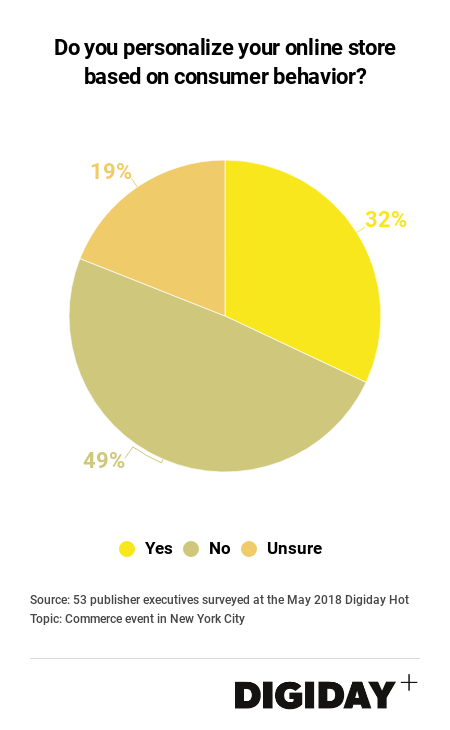Digiday Research: Publishers’ online stores lack personalization

This research is based on unique data collected from our proprietary audience of publisher, agency, brand and tech insiders. It’s available to Digiday+ members. More from the series →
Publishers are increasingly turning to commerce as an additional revenue stream beyond advertising and charging for their content. But as they ramp up those efforts, many are yet to implement some key tactics that are now table stakes for e-Commerce companies.
One such area is personalization. Publishers are growing increasingly comfortable with the idea of personalizing their websites and content after a period of uncertainty. Fifty-six percent of publishers in a previous Digiday survey said personalizing their content to readers’ interests was a high priority.
But beyond content, many publishers have yet to bring behavioral personalization to their online stores as well, according Digiday research. At the Digiday Hot Topic: Commerce event in May of this year, only 32 percent of the 53 publisher executives whose companies operated online stores said they personalized those stores based on consumer behavior.
Offering personalized experiences in online stores can help boost commerce revenues. A 2017 report from the Boston Consulting Group found that retailers who personalized stores saw a 6 percent to 10 percent increase in revenue. But beyond increasing revenues, such personalization can also help build stronger direct connections with consumers and increase customer loyalty.

Earlier research from Digiday found that less than half of publishers monetize their audiences with commerce, and for those that do the majority of their revenue comes indirectly via affiliate commissions. As many look to expand beyond affiliate links into their own e-commerce stores, tactics such as personalization could be key to maximizing revenues.
Publishers might choose to personalize their stores by promoting items related to pages that readers recently visited. Or by highlighting products that are most likely to appeal to users based on data such as gender, age, location and other demographic data.
The challenge, however, is that publishers can be limited by the type of data they can utilize to offer a personalized experience. Nearly six in ten publishers said they could only personalize their content based on their page’s context, not users’ behaviors or attributes.
For European publishers, the General Data Protection Regulation might make personalizing online stores all the more difficult because consumers would have to explicitly opt-in to sharing their data for that purpose. Publishers should also cut themselves some slack when it comes to personalization of online stores. Only 15 percent of companies actually personalize their online stores at a high level according to the BCG report.
More in Media

Digiday+ Research: Dow Jones, Business Insider and other publishers on AI-driven search
This report explores how publishers are navigating search as AI reshapes how people access information and how publishers monetize content.

In Graphic Detail: AI licensing deals, protection measures aren’t slowing web scraping
AI bots are increasingly mining publisher content, with new data showing publishers are losing the traffic battle even as demand grows.

In Graphic Detail: The scale of the challenge facing publishers, politicians eager to damage Google’s adland dominance
Last year was a blowout ad revenue year for Google, despite challenges from several quarters.





